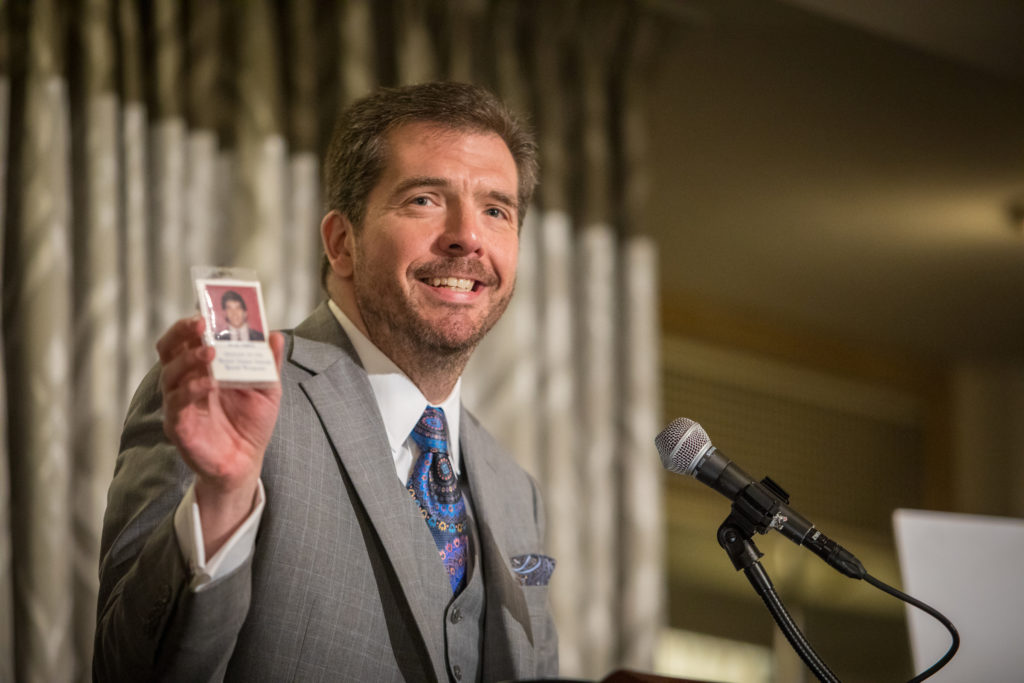
Brian Kamoie FEMA official and USSYP – PA 1989, speaking to USSYP in 2018
The senior public officials who speak to the USSYP delegates during Washington Week offer such a bounty of advice and illuminating stories from their personal lives and careers that the delegates often run out of ink taking notes in their leather-bound keepsake journals. As a gift for the holiday season, we would like to share some highlights from past speakers with our USSYP community. Featured here are some gems of insight from two long-time Washington insiders, each having worked for more than one president, in careers that transcend politics and party in service to the nation. And despite different pathways into public service, the two served together on the White House National Security Council and have gone on to make myriad contributions to our country.
Brian Kamoie is the associate administrator for Mission Support at the Federal Emergency Management Agency (FEMA), as well as a USSYP 1989 alumnus from Pennsylvania. He received his Bachelor of Arts in political science and policy studies from Dickinson College and his law degree from George Washington University. Mr. Kamoie has served as assistant administrator for the Grant Programs at FEMA, a senior director for the White House National Security Council, and a policy director for the U.S. Department of Health and Human Services. He was also an associate professor for Health Policy at George Washington University. Mr. Kamoie spoke during USSYP 2018.
Nicholas Rasmussen was the director of Counterterrorism at the National Counterterrorism Center (NCTC), following his confirmation by the United States Senate in 2014. He now serves as senior director of the counterterrorism program at the McCain Institute, while also teaching at the Georgetown School of Foreign Service. Mr. Rasmussen received a Bachelor of Arts from Wesleyan University in Connecticut and a Master’s degree from the Woodrow Wilson School at Princeton University. He began his career in public service as an intern at the Bureau of Political Military Affairs in the Department of State, working on Arab-Israel peace, U.S.-North Korea relations, and Persian Gulf security. Mr. Rasmussen spoke during USSYP 2017.
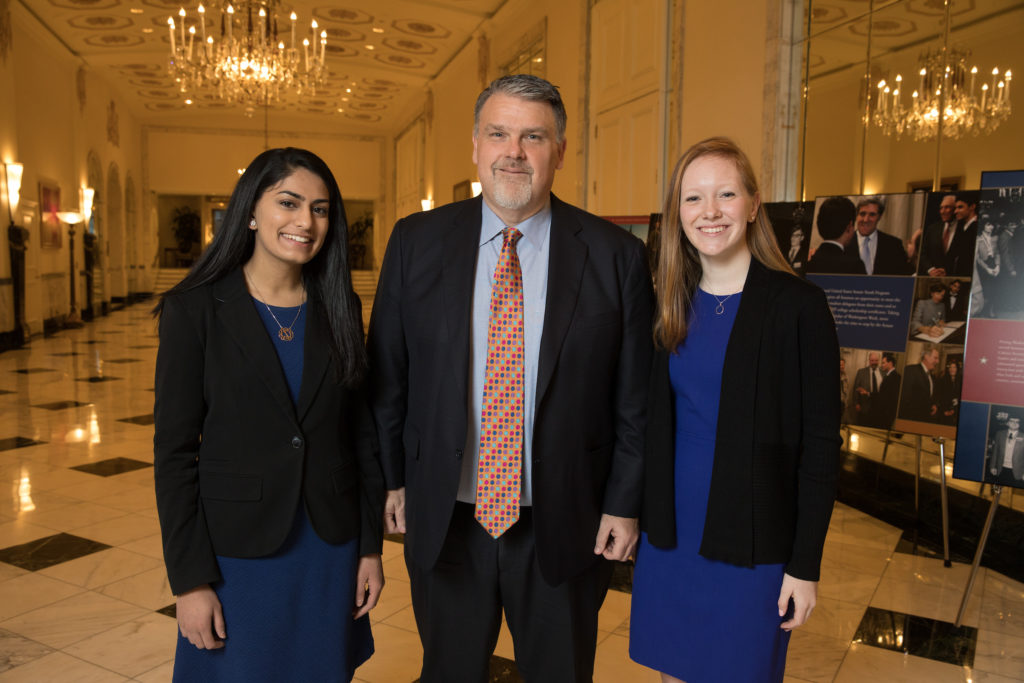
Nicholas Rasmussen with USSYP delegates Isha Dalal and Emily Sullivan in 2017
On the path to public service — Brian Kamoie:
I always knew from my time at the program that I wanted to do some work in public service, but needed to gain a little bit of experience in the private sector before I did that, so I practiced law. I did some consulting and ultimately ended up back at George Washington University on the faculty in 2001. My original government assignment was on loan from the faculty of George Washington University in 2004 and intended to be for one year. And I have yet to leave…
James Carville, who ran President Clinton’s election and reelection campaigns in the ’90s, said life really comes down to a choice: “You have in this life two things to give away: your love and your labor and the fruits of that labor. Choose carefully, and to choose to dedicate your love and your labor to the public good is something you will never regret.” Public service is a privilege, and every day should be treated that way. I’m accountable to you. I work for you. Taxes pay my salary and that’s why, when somebody stops me on the street and asks me a question, because they know I work for the government, I stop and answer it, because I work for the people, and I hope you have the opportunity to, as well.
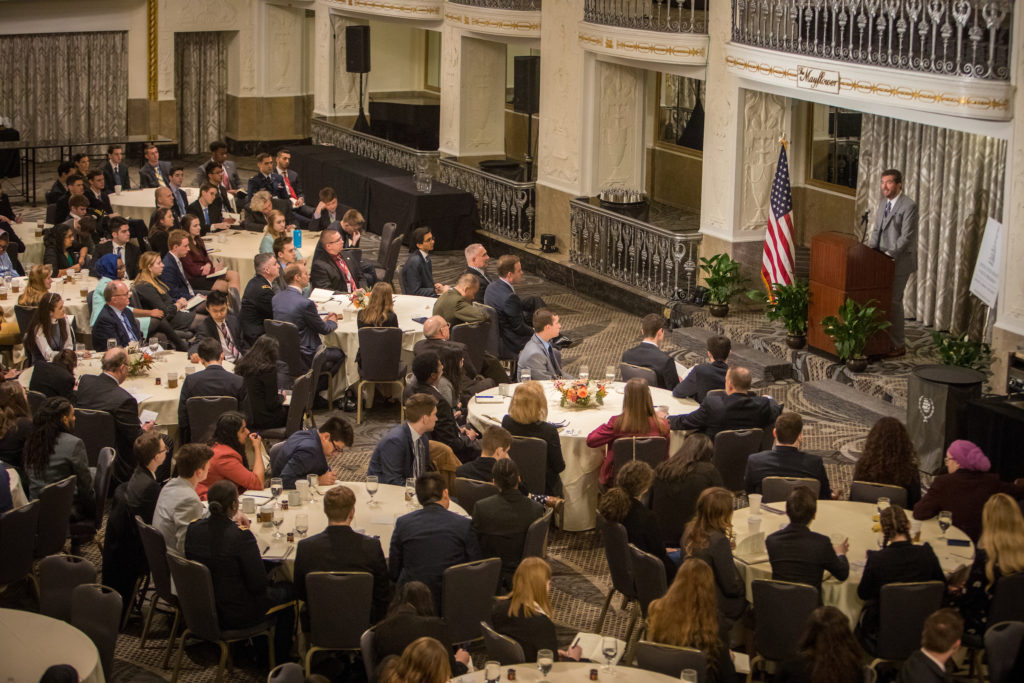
Brian Kamoie addressing the USSYP delegates.
On learning — Nicholas Rasmussen:
If you are preparing for a career in public service I would just say this: make sure you develop the ability to write well and to think analytically, because these are invaluable skills. There is no pathway that you will pursue where these skills won’t be incredibly valuable to you. Whatever is going to be happening in the global economy, there is always a job for someone who can think, speak, and write with clarity and with precision, and that is true even if you are in the hard sciences or the social sciences, no matter what discipline you pursue. So as college students, whether that is next year or the year after, you will have the opportunity to strengthen and expand on these skills, and you should know that they will serve you well, whatever career path you decide to follow.
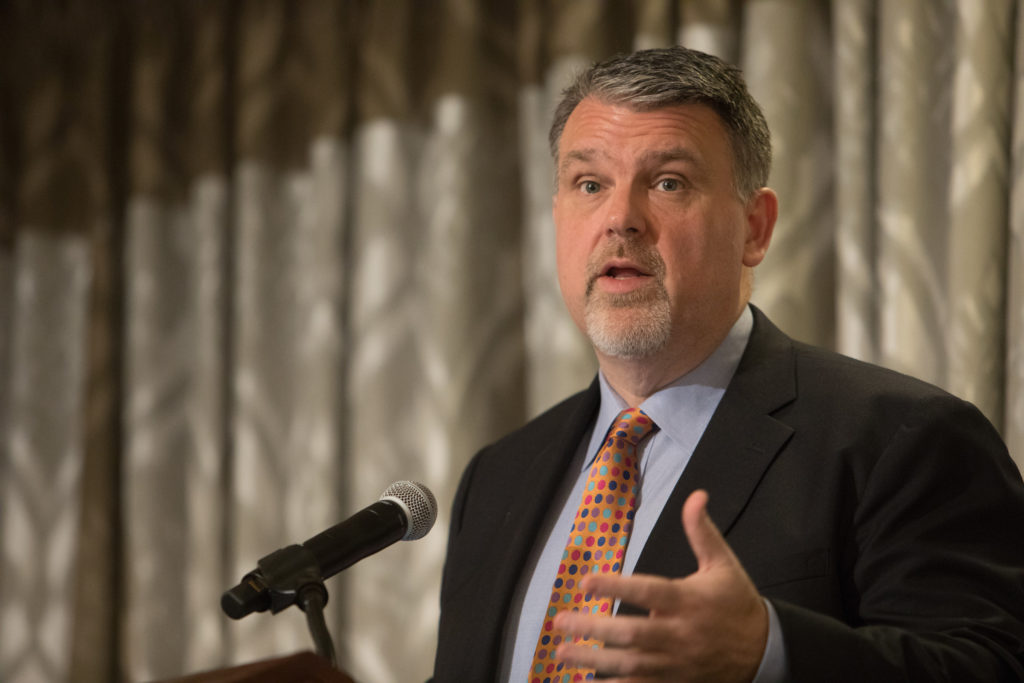
Nicholas Rasmussen addressing the USSYP delegates in 2017.
On learning — Brian Kamoie:
Commit now to learning how to learn. Invariably, you might ask me, as many people in high school and in college do, “What do I major in to get to the National Security Council at the White House? What courses do I take?” My path wasn’t direct, but what I assure you has helped above all is knowing that I could learn new things, be it how do flu viruses mutate? How do we make flu vaccine? In chicken eggs, by the way, and synthetically now. What’s a blowout preventer on an oil well a mile under the ocean floor? How do you stop the flow of oil when the blowout preventer fails? How does a nuclear reactor work and why do you have to keep spent fuel pools cool? So that they don’t heat up and start emitting radiation into the air…Days in public life will not be boring, I assure you, but commit now to learning how to learn.
On opportunity — Brian Kamoie:
I spent time as a career employee during the George W. Bush administration, I spent four years as a career employee during the Obama administration, and then four years as a political appointee, and now I’ve returned to the career federal service during the Trump administration. So, I have straddled both the career executive, and political appointee line, but I stand before you today as a career person in federal service. And the hard problems I have confronted are why we need you in public service, now more than ever. Cybersecurity, transnational criminal organizations, the opioid epidemic. We need you now more than ever. These are challenges that no one state, no one government, no one company can solve alone.
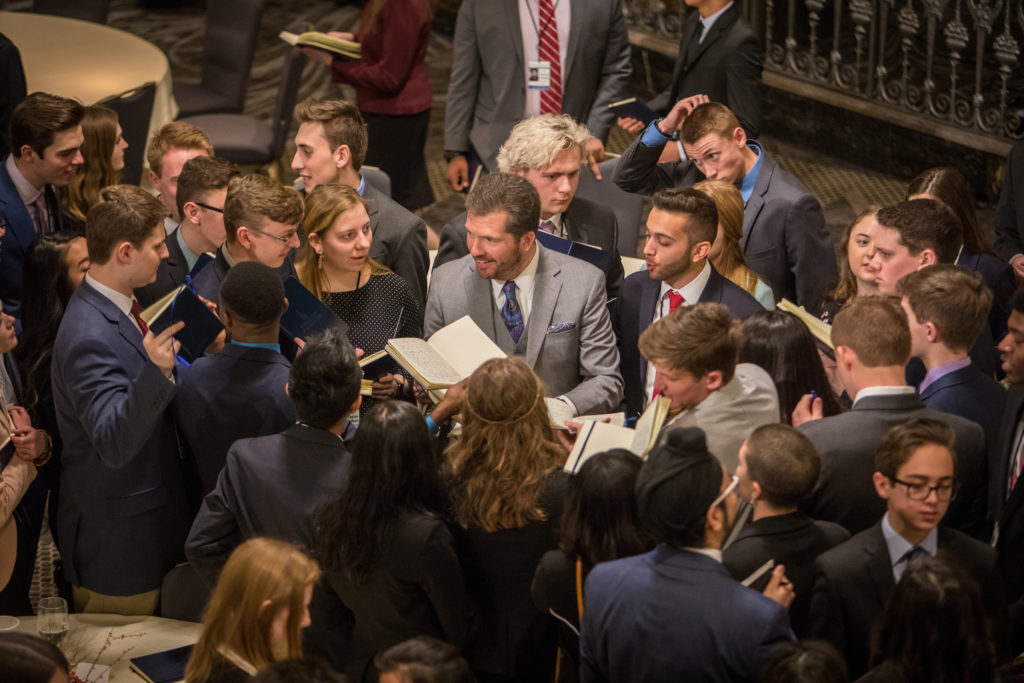
Brian Kamoie interacting with USSYP delegates following his remarks.
On opportunity — Nicholas Rasmussen:
As both a presidential appointee and a lifelong career civil servant, I’ve had the honor of serving multiple administrations, both Democrat and Republican. I served at the White House under President George W. Bush, then President Obama appointed me to become the head of the National Counterterrorism Center, and President Trump’s administration asked me to stay on into the new administration. As the director of NCTC, one of my key jobs is to give the president and the other senior leaders of our government the most complete and clearest possible picture about the threat of terrorism that we are facing as a country. So, I often spend my days consuming and reading analysis prepared by trained intelligence officers who work for me, I spend my days briefing and attending meetings with Members of Congress and the White House, interacting with foreign partners, leaders from foreign governments, and other colleagues in the intelligence community all around Washington. You can see how my advice about developing the ability to absorb large amounts of information, to think critically and analytically about that information, and then to communicate it very succinctly and precisely, is relevant to the job I have today, and it goes back all the way, as I said, to my first year in college.
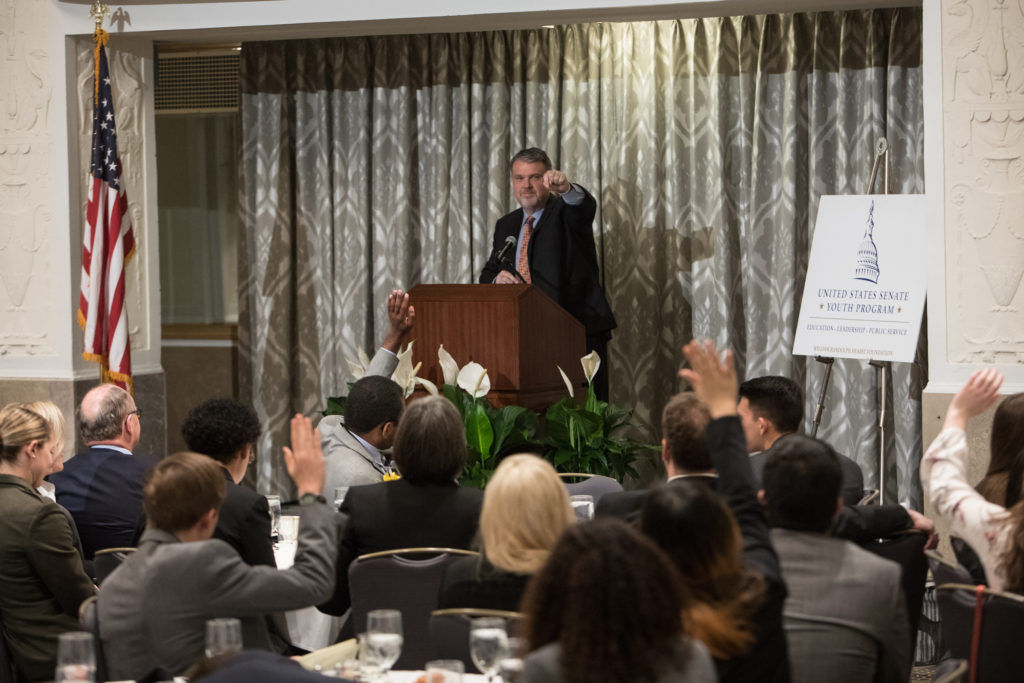
Nicholas Rasmussen engaging in a lively Q&A with the USSYP delegates.
And as we look to the future, we need people with political science, history, computer science, engineering, language skills, psychology—and other skill sets, working in counterterrorism. My request to you is this: Please pursue higher education, college and beyond. Develop the skills that you will need to make an impact and make a mark in public service. Someday I hope I’ll be serving alongside you, inside the government, working to keep our fellow Americans safe. In addition, your generation has grown up with personal electronic devices in your hands, essentially since birth, and you know how to use them to create new things, to communicate ideas, and to share ideas with people across the planet. I hope you will use these skills in public service to strengthen our national security in the future.
© Photos by Jakub Mosur and Erin Lubin
